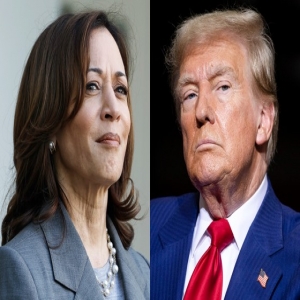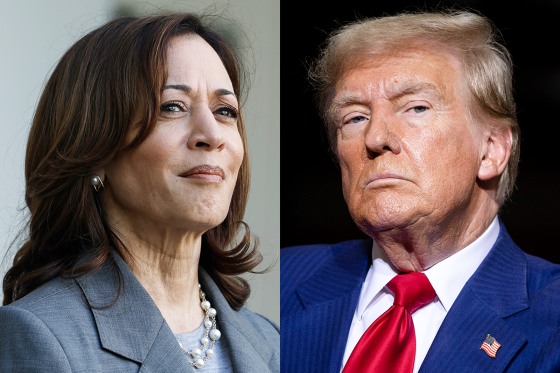
.png) Chhotebhai
Chhotebhai

It is said that comparisons are odious, but we need contrasts. We keep adjusting them on our phones, TVs and PCs. Contrasts, however, are not limited to electronic screens. More importantly, contrasts, especially stark contrasts, help us understand many things in life. Comparisons and contrasts are perhaps the best way forward.
Over the last few months, especially after Kamala Harris entered the US presidential election fray, I have been keenly following the excessively long, drawn-out process of elections there. This, in fact, is my first comparison and contrast. The US race stretches out for about two years, with primaries and then the election/endorsement of the party's nominee. In contrast, in India, we have just about 20 days to canvass between the filing of nominations and voting.
The US process is much too long and drawn out, eliciting yawns and election fatigue. In contrast, the 20-day window in India is too short to get to know a candidate and what (s)he stands for. This could at least be extended to a month. What I like about the American system is the procedure for selecting candidates, where party delegates choose their candidates. Arvind Kejriwal experimented with this in Delhi in his first flush of electoral excitement. Subsequently, he reverted to the High Command style of imposing candidates.
Another good thing about the American style is the debates in which candidates face off live on TV. Though not a perfect system, it certainly helps to know the respective candidates' strengths and weaknesses. In contrast, debate is almost non-existent here in India, even in parliament. In the current regime, presiding officers of both houses act more like classroom monitors, telling opposition members to shut up and sit down.
Another thing about the US system that I really like is the way that TV anchors/hosts roast the candidates. There is also a high level of sarcasm and criticism. Again, in contrast, YouTube hosts here, like Dhruv Rathee and Ravish Kumar, have to constantly look over their shoulders to see if the CBI, ED or some other government agency is coming for them. It must, however, be said to their credit that in the last Lok Sabha elections, this Fifth Estate of social influencers played a major role in moulding public opinion.
If there is one area where the Indian electoral system is better than the American one, it is the time lag between the declaration of results and installation in office. Once the results are declared and the legislative party leader is elected, it is just a couple of days before the swearing-in ceremony takes place, usually on an auspicious date of the winner's choice. In contrast, in the US, while the presidential results are out by the first week of November, the installation occurs two months later, in the first week of January. This gives troublemakers ample time to raise a stink, as Trump and his supporters did in January 2021 after he lost to Joe Biden.
An area where both countries seem to be on the same page is exit polls. After the 2024 Lok Sabha and now Haryana assembly election exit polls went horribly wrong, I have lost all confidence in them. Even a veteran like Rajdeep Sardesai said he would not stick his neck out to make any predictions in the future. In the US, exit polls are even trickier because they have to be done state-wise, as in each state, the winner takes all. That was how Hilary Clinton lost in 2016. Opinion polls showed her lead over Trump in popularity ratings, but she lost because of the "winner takes all" system. Again, in contrast, in India, the "first past the post" system applies only to individual constituencies. I daresay that the Indian system is better.
Let us now address some critical questions. Who is better—Harris or Trump? Perhaps this needs to be broken down into four subtexts: Who is better for America, who is better for the world, who is better for India, and who is better for Christians?
Trump's appeal is to "Make America Great Again" (MAGA). Perhaps this is what appeals most to his supporters, predominantly white males. Ironically, by saying this, they are simultaneously admitting that America is no longer great! This hyper-nationalism, coupled with religious fundamentalism, has been used to devastating effect in India too. Trump alleges that Haitian migrants are eating pet dogs and cats. Modi points to threats from "others" like Muslims and Pakistanis. In fairness, Indira Gandhi also used the spectre of the "foreign hand" to stampede powerless people into her fold, to hold the sceptre of power. Going by public perception, not necessarily the best barometer, Trump probably comes out best in the answer to the first question.
Next, who is better for the world? I look at it from a single standpoint. Who has a stronger commitment to world peace? Unfortunately, America has a dirty record from Vietnam to Iraq, Afghanistan and now Ukraine and Gaza. The US still holds bragging rights as the world's policeman. The UN – what's that? Hence, it becomes a difficult question to answer. MAGA says, why waste American money on defending Ukraine. Biden and, by default, Harris have gone on pumping sophisticated arms and ammunition into Ukraine, directly benefiting its powerful arms lobby. Worse still, it has unabashedly supported disproportionately devastating attacks on innocent and defenceless people in Gaza and now Lebanon.
Firing missiles from a safe distance is not an act of bravery. Harris has made some noises about the de-escalation of the Gaza attacks and the easy access to assault rifles in the US, but in the final equation, there is not much to choose from as far as world peace is concerned. However, I will now apply a yardstick that I often advocate – that a mad dog is more dangerous than an enemy. You can anticipate an enemy's actions but not that of a mad dog.
Now, to the third question – who is better for India? Another tricky one. In 2020, Modi made an audacious call at an NRI rally in America: "Abki baar Trump Sarkaar" (This time Trump for president). It was gross interference in the internal affairs of another country. Imagine if Giorgia Meloni were to root for Modi in an Indian election. All hell would break loose. Fortunately, Modi did not even attempt to meet either Trump or Harris on his latest trip to New York.
Harris is half Indian, and Trump's Vice President running mate, JD Vance, has an Indian wife, Usha. I cannot predict what impact this would have on American voters of Indian origin. But I doubt their Indianness would impact relations with India. That will be determined by realpolitik and lucrative arms sales to India. Trump had earlier referred to Modi as a friend. In the same breath, he accused India of being the biggest abuser of trade tariffs.
Now, to the last question – how do Christians view the two candidates? It is no secret that the Catholic bishops of the US have been rooting for Trump because of his anti-abortion stance, to the exclusion of all other factors. These same bishops are also inimical to Pope Francis' reformist and liberal agenda. Trump often refers to Harris as a Marxist left liberal.
In contrast, I have seen a few YouTube videos of an Episcopalian priest, Father David, who questions Christians supporting Trump. He calls him a fornicator, cheater and convicted felon (criminal). He quotes Pope Francis as saying that one needs to choose the lesser evil between the senhor (Trump) and senhora (Harris). While decrying abortion, on the one hand, Francis uses equally strong terms to criticise those who treat migrants like cattle. Francis, as we know, is very passionate about migrant rights. David also opines that the presidential race should not boil down to one issue – abortion. From a Christian perspective, I would say that a person more committed to peace and human rights is the person of choice.
Climate change is another issue that should concern world citizens, not just Americans. We know that Trump dismisses this as a joke. He pokes fun at electric cars and claims that windmills cause cancer! If this isn't madness, what is? Remember Don Quixote charging at windmills? Not very different from Don Trump.
In Pope Francis's words, the Americans have to choose the lesser of the two evils, Hobson's choice, comparisons and contrasts notwithstanding.